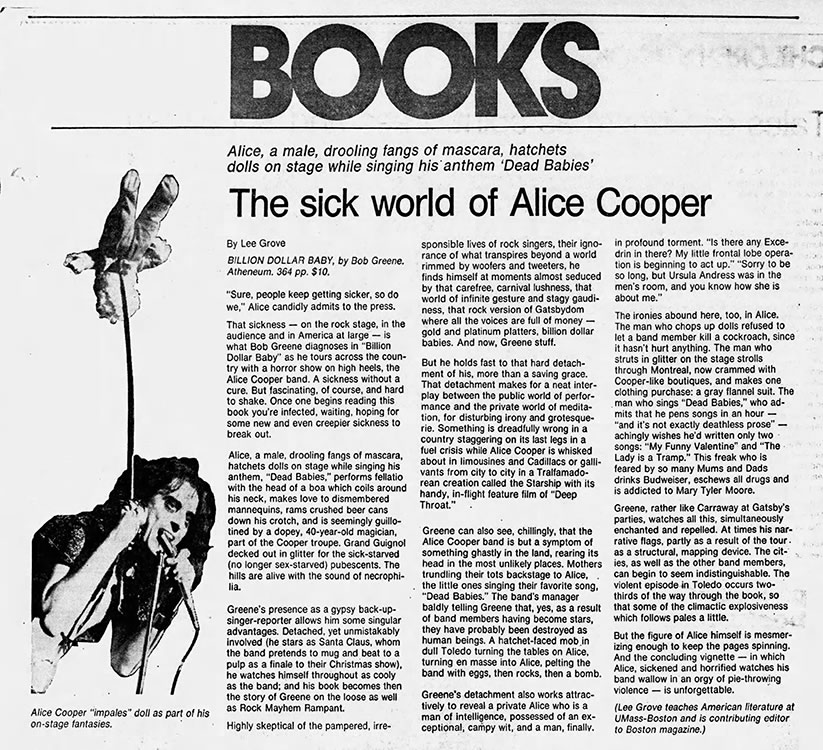Article Database

Boston Globe
December 19, 1974
The sick world of Alice Cooper
Alice, a male, drooling fangs of mascara, hatchets dolls on stage while singing his anthem 'Dead Babies'
Author: Lee Grove
BILLION DOLLAR BABY, by Bob Greene.
Atheneum. 364 pp. $10.
"Sure, people keep getting sicker, so do we," Alice candidly admits to the press.
That sickness — on the rock stage, in the audience and in America at large — is what Bob Greene diagnoses in "Billion Dollar Baby" as he tours across the country with a horror show on high heels, the Alice Cooper band. A sickness without a cure. But fascinating, of course, and hard to shake. Once one begins reading this book you're infected, waiting, hoping for some new and even creepier sickness to break out.
Alice, a male, drooling fangs of mascara, hatchets dolls on stage while singing his anthem, "Dead Babies," performs fellatio with the head of a boa which coils around his neck, makes love to dismembered mannequins, rams crushed beer cans down his crotch, and is seemingly guillotined by a dopey, 40-year-old magician, part of the COoper troupe. Grand Guignol decked out in glitter for the sick-starved (no longer sex-starved) pubescents. The hills are alive with the sound of necrophilia.
Greene's presence as a gypsy back-up-singer-reporter allows him some singular advantages. Detached, yet unmistakably involved (he stars as Santa Claus, whom the band pretends to mug and beat to a pulp as a finale to their Christmas show), he watches himself throughout as cooly as the band; and his book becomes then the story of Greene on the loose as well as Rock Mayhem Rampant.
Highly skeptical of the pampered, irresponsible lives of rock singers, their ignorance of what transpires beyond a world rimmed by woofers and tweeters, he finds himself at moment almost seduced by the carefree, carnival lushness, that world of infinite gesture and stagy gaudiness, that rock version of Gatsbydom where all the voices are full of money — gold and platinum platters, billion dollar babies. And now, Greene stuff.
But he holds fast to that hard detachment of his, more than a saving grace. That detachment makes for a neat interplay between the public world of performance and the private of meditation, for disturbing irony and grotesquerie. Something is dreadfully wrong in a country staggering on its last legs in a fuel crisis while Alice Cooper is whisked about in limousines and Cadillacs or gallivants from city to city in a Tralformadorean creation called the Starship with its handy, in-flight feature film of "Deep Throat."
Greene can also see chillingly, that the Alice Cooper band is but a symptom of something ghastly in the land, rearing its head in the most unlikely places. Mothers trundling their tot backstage to Alice, the little ones singing their favorite song, "Dead Babies." THe band's manager baldly telling Greene that, yes, as a result of band members having become stars, they have probably been destroyed as human beings. A hatchet-faced mob in dull Toledo turning the tables on Alice, turning en masse into Alice, pelting the band with eggs, then rocks, then a bomb.
Greene's detachment also works attractively to reveal a private Alice who is a man of intelligence, possessed of an exceptional, campy wit, and a man, finally, in profound torment. "Is there any Excedrin in there? My little frontal lobe operation is beginning to act up." Sorry to be so long, but Ursula Andress was in the men's room, and you know how she is about me."
The ironies about here, too, in Alice. The man who chops up dolls refused to let a band member killer a cockroach, since it hasn't hurt anything. The man who struts in glitter on the stage and strolls through Montreal, now crammed with Cooper-like boutiques, and makes one clothing purchase: a gray flannel suit. The man who sings "Dead Babies," who admits that he pens songs in an hour — "and it's not exactly deathless prose" — achingly wishes he'd written only two songs: "My Funny Valentine" and "The Lady is a Tramp." This freak who is feared by so many Mums and Dads drinks Budweiser, eschews all drugs and is addicted to Mary Tyler Moore.
Greene, rather like Carraway at Gatsby's parties, watches all this, simultaneously enchanted and repelled. At times his narrative flags, partly as a result of the tour as a structural, mapping device. The cities, as well as the other band members, can begin to seem indistinguishable. The violent episode in Toledo occurs two-thirds of the way through the boo, so that some of the climatic explosiveness which follows pales a little.
But the figure of Alice himself is mesmerizing enough to keep the pages spinning. And the concluding vignette — in which Alice, sickened and horrified watches his band wallow in an orgy or of pie-throwing violence — is unforgettable.
(Lee Grove teaches American literature at UMass-Boston and is contributing editor to Boston magazine.)


